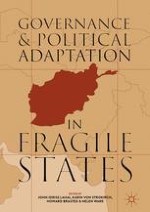2019 | OriginalPaper | Buchkapitel
4. From Saving Failed States to Managing Risks: Reinterpreting Fragility Through Resilience
verfasst von : Nicolas Lemay-Hébert
Erschienen in: Governance and Political Adaptation in Fragile States
Aktivieren Sie unsere intelligente Suche, um passende Fachinhalte oder Patente zu finden.
Wählen Sie Textabschnitte aus um mit Künstlicher Intelligenz passenden Patente zu finden. powered by
Markieren Sie Textabschnitte, um KI-gestützt weitere passende Inhalte zu finden. powered by
